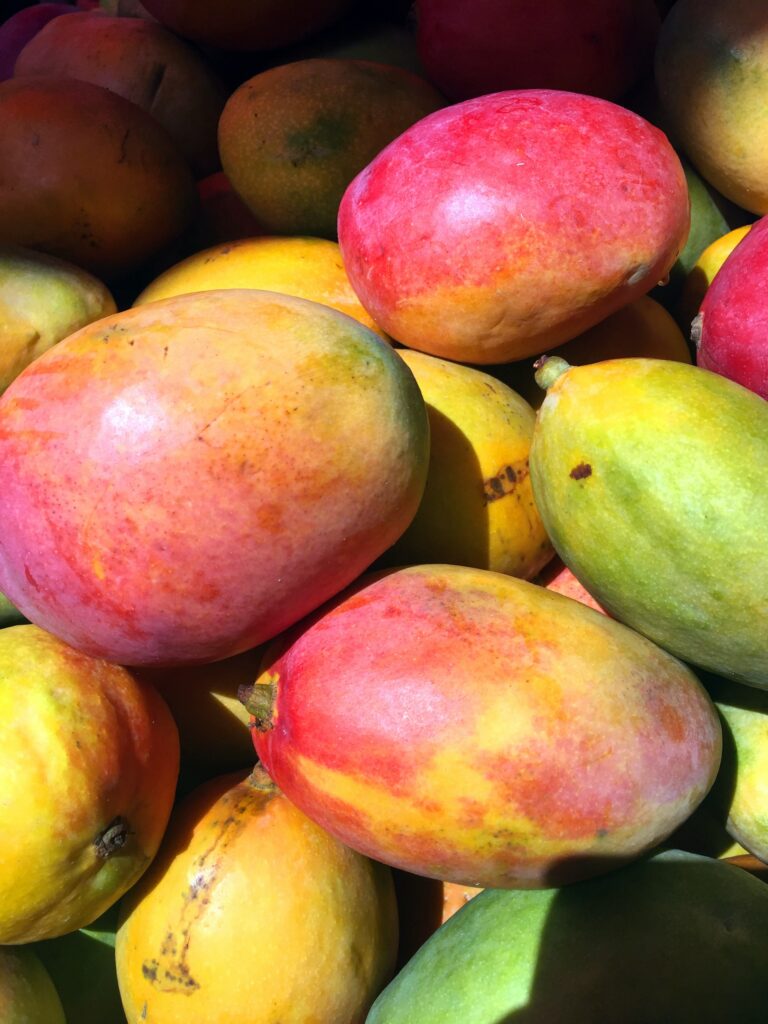4 Reasons to Eat Mangos
Did You Know?
Mango (Mangifera Indica) is a fruit that grows in warm tropical climates with origins in India and eastern Asia. Mango fruits develop from small, pink flowers that sprout from a tree that grows between 60-100 feet tall. When ready for harvest, mango fruits can be yellow, orange, red, green, or a combination of colors. They can also come in a variety of shapes like round or long, heart-shaped, kidney-shaped, or oval. They contain multiple health benefits like a rich source of vitamins A, D, and C, and potent antioxidant properties. Read below to discover 4 health benefits of eating mangos

4 Health Benefits of Mangos
- Potent Antioxidant Properties
Mangos have been known to possess a potent antioxidant called Mangiferin. Research has proved that Mangiferin has anti-inflammatory, antidiabetic, anticancer, and antimicrobial properties. It has also been shown to scavenge free radicals and regulate inflammatory cells. One study found that the antioxidative properties of mangiferin interfere with inflammatory cells in disorders like colitis and in anti-asthmatic inflammation by downregulating inflammatory cells like cytokines and pro-inflammatory mediators.
- Improve Gut Health
The active antioxidant compounds in mangoes are linked to improving gut health through their ability to alter gut bacteria and reduce inflammation. One study found the antioxidant (gallotannin) in mangos modulates lactobacillus plantarum, a type of bacteria usually supplemented through fermented foods. Researchers discovered that this modulation improved GI health, lowered inflammation, and supported intestinal integrity. Another study supported the intestinal benefits of gallotannin in an 8-week study on participants with inflammatory bowel disease (IBD or Crohn’s). The study involved an initial assessment of blood samples, a food questionnaire, and an endoscopic study. Researchers discovered an increase in bacteria like L.planatarum, L.reuter, and L.lactis to have occurred after 8 weeks of daily mango consumption. The researchers discovered that mango alleviated inflammation and GI discomfort due to increased gut bacteria for gallotannin metabolism. Moreover, since an increase in the Lactobacillus bacterial species has been linked to having anti-inflammatory properties in the gut, in this way, mango improved overall gut health.

- May reduce risk for Cancer
Fruits and vegetables have long been celebrated to have bioactive properties that can be chemoprotective. Overall, mangos are high in polyphenols which are known to protect against multiple diseases like cancer. One study published in the Journal of Genetics and Molecular Research proved mangiferin to protect against leukemia by interfering and destroying the cell during the rapid growth phase where cells multiply and potentially spread through the body.
- Protect against Heart Disease
One study supported mangiferin’s protection against heart disease by protecting cardiac tissues against heart damage. The study published in the Journal of Ethnopharmacology was conducted on rats and found that mangiferin had an effective role in protecting the heart after an induced heart attack. The researchers induced one group of rats with mangiferin over 28 days before inducing a myocardial infarction (MI). Results indicated that the group pre-treated with mangiferin had less cardiac damage and faster equilibrium of heart tissue enzymes secreted under the stress of an MI.

What Should You Do About It?
First, talk to your doctor. Especially if you have a specific history or take certain medications. Otherwise, mangos are generally safe for most people. They can be consumed alone or diced over yogurt, mixed into salads, blended in a smoothie, or grilled on top of burgers. The recommendation is never to judge the mango by its color but give it a squeeze. If it slightly gives in to the pressure of your fingers, it is ripe and can be purchased. If you accidentally buy an unripe fruit, keep it on your counter in a bag to expedite ripening. The good news is that mangos are available all year round and therefore you can have continued access to different varieties. The American Heart Association recommends 4 servings of fruit a day so mangoes are an option to include. The American Diabetes Association also recommends fruit consumption using the carbohydrate counting method, the plate method, or glycemic index. Mangos are included in the list of common fruits to enjoy but beware of portion sizes and always follow the plan your doctor recommends.
Click this LINK to see a chart on varieties and availabilities courtesy of the National Mango Board, a national organization that promotes and researches mangos for public education.

How To Make It SMART
SHORT- Commit to including mangos into your diet. Mangoes can be eaten fresh or added to main dishes, sauces, or desserts. There are a variety of ways to consume them as part of the healthy eating habits in a healthy lifestyle
MEASURABLE- Mangos should be consumed as part of a healthy diet. They will not cure one ailment but will support your health and substitute other high-sugar snack options.
ATTAINABLE- This should be something worth implementing especially as a choice to support a healthy wellbeing
REASONABLE- Mangos are a fruit available all year round and often enjoyed by most people. If you choose to buy canned fruit, choose fruit packed in its own juices, not sweetened, or including added sugars like syrup
TIMELY- Commit to including mangoes into your diet to support overall health. Choose to substitute a high sugar snack with fruit for 30-60 days. I have previously written about blueberries, strawberries, apples, pineapples, and bananas.
The American Heart Association recommends 4 servings of fruit a day. While one serving of fresh fruit is 1/2 cup, a whole cup of mangoes means you are halfway through your daily recommendation. So, pick one and implement it according to serving size and you will find it becomes easier over time to include healthy options into your daily intake.
Remember, choosing health is a lifelong journey and commitment, not a quick fix
As always,
Love yourself in health, one day at a time



